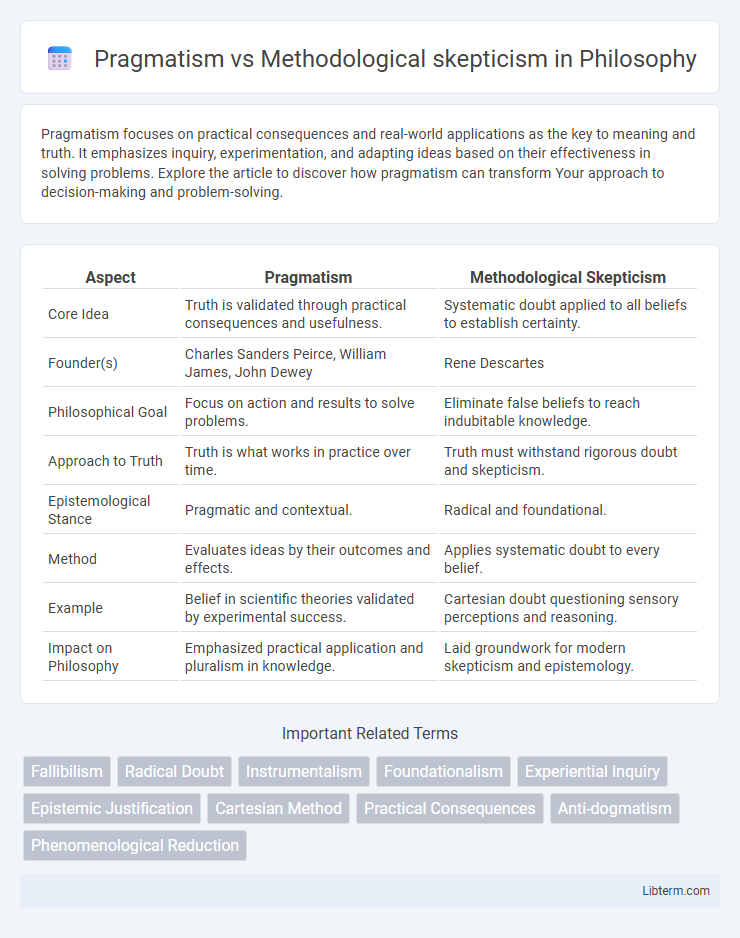Pragmatism focuses on practical consequences and real-world applications as the key to meaning and truth. It emphasizes inquiry, experimentation, and adapting ideas based on their effectiveness in solving problems. Explore the article to discover how pragmatism can transform Your approach to decision-making and problem-solving.
Table of Comparison
| Aspect | Pragmatism | Methodological Skepticism |
|---|---|---|
| Core Idea | Truth is validated through practical consequences and usefulness. | Systematic doubt applied to all beliefs to establish certainty. |
| Founder(s) | Charles Sanders Peirce, William James, John Dewey | Rene Descartes |
| Philosophical Goal | Focus on action and results to solve problems. | Eliminate false beliefs to reach indubitable knowledge. |
| Approach to Truth | Truth is what works in practice over time. | Truth must withstand rigorous doubt and skepticism. |
| Epistemological Stance | Pragmatic and contextual. | Radical and foundational. |
| Method | Evaluates ideas by their outcomes and effects. | Applies systematic doubt to every belief. |
| Example | Belief in scientific theories validated by experimental success. | Cartesian doubt questioning sensory perceptions and reasoning. |
| Impact on Philosophy | Emphasized practical application and pluralism in knowledge. | Laid groundwork for modern skepticism and epistemology. |
Introduction to Pragmatism and Methodological Skepticism
Pragmatism emphasizes practical consequences and real-world applications as the basis for meaning and truth, asserting that ideas are validated through their usefulness and effectiveness. Methodological skepticism involves systematic doubt and critical questioning, aiming to establish knowledge by discarding beliefs that can be doubted to reach indubitable truths. Both approaches address the acquisition of knowledge but differ significantly: pragmatism focuses on results-oriented validation, while methodological skepticism prioritizes certainty through rigorous doubt.
Historical Background and Philosophical Origins
Pragmatism emerged in the late 19th century through philosophers like Charles Sanders Peirce and William James, emphasizing practical consequences and experiential validation as criteria for truth. Methodological skepticism traces back to Rene Descartes in the 17th century, advocating systematic doubt to establish certain knowledge by questioning all beliefs. The contrasting origins highlight pragmatism's roots in American philosophy and empirical application, while methodological skepticism is grounded in Cartesian rationalism and foundational inquiry.
Core Principles of Pragmatism
Pragmatism centers on the principle that truth is verified through practical consequences and usefulness in real-world applications, emphasizing action and experiential outcomes over abstract theorizing. It values ideas as tools for problem-solving and views knowledge as inherently fallible and evolving with new experiences. Methodological skepticism, in contrast, prioritizes systematic doubt and the suspension of belief until certainty is achieved, highlighting rigorous inquiry over pragmatic utility.
Central Tenets of Methodological Skepticism
Methodological skepticism centers on systematic doubt, questioning all beliefs to establish certainty, emphasizing rigorous scrutiny of knowledge claims. It asserts that suspending judgment on unverifiable information leads to a solid foundation for truth, contrasting pragmatism's focus on practical outcomes and utility of beliefs. This philosophical approach underlines the importance of doubt as a tool for intellectual clarity and epistemic rigor.
Key Proponents and Influential Thinkers
Pragmatism, championed by philosophers like Charles Sanders Peirce, William James, and John Dewey, emphasizes practical consequences and real-world applications as the basis for truth and meaning. Methodological skepticism, famously developed by Rene Descartes, employs systematic doubt to question the certainty of knowledge and lay a foundation for scientific inquiry. Both philosophical approaches significantly shaped epistemology, with pragmatism focusing on utility and experiential verification, while methodological skepticism prioritizes rigorous doubt and foundational certainty.
Epistemological Approaches Compared
Pragmatism evaluates knowledge based on practical consequences and utility, emphasizing belief systems that yield successful outcomes in experience. Methodological skepticism systematically doubts all knowledge claims to establish certainty through rigorous questioning, seeking indubitable foundations for belief. Compared epistemologically, pragmatism prioritizes usefulness and adaptability of knowledge, while methodological skepticism demands absolute certainty, highlighting a contrast between practical validation and radical doubt.
Application in Scientific and Philosophical Inquiry
Pragmatism emphasizes practical outcomes and real-world applications as criteria for truth, guiding scientific inquiry toward theories that generate reliable predictions and technological advancements. Methodological skepticism prioritizes systematic doubt and rigorous questioning to eliminate uncertainty, ensuring philosophical and scientific claims withstand critical scrutiny and empirical testing. Both approaches contribute to knowledge production by balancing practical utility with rigorous validation, enhancing the robustness of scientific and philosophical methodologies.
Strengths and Limitations of Pragmatism
Pragmatism emphasizes practical consequences and real-world applications, making it effective for problem-solving and adaptive decision-making across diverse contexts. Its strength lies in flexibility and focus on results rather than rigid adherence to abstract principles, facilitating innovation and progress. However, pragmatism's limitation is its potential to overlook deeper truths or theoretical consistency, sometimes sacrificing accuracy for utility.
Challenges and Critiques of Methodological Skepticism
Methodological skepticism faces challenges regarding its potential for infinite regress, as doubting every belief can hinder the establishment of any firm knowledge. Critics argue that this approach may lead to radical skepticism, undermining practical decision-making and scientific progress. Pragmatism counters these critiques by emphasizing practical outcomes and the usefulness of beliefs in guiding action over absolute certainty.
Conclusion: Bridging Pragmatism and Methodological Skepticism
Pragmatism emphasizes practical outcomes and the utility of beliefs, while methodological skepticism insists on systematic doubt to achieve certainty. Bridging these philosophies involves recognizing that pragmatic results can guide inquiry without abandoning critical skepticism at its core. This synthesis fosters a balanced epistemology where doubt refines beliefs that remain useful and adaptable in real-world contexts.
Pragmatism Infographic

 libterm.com
libterm.com